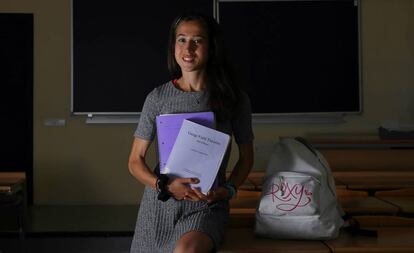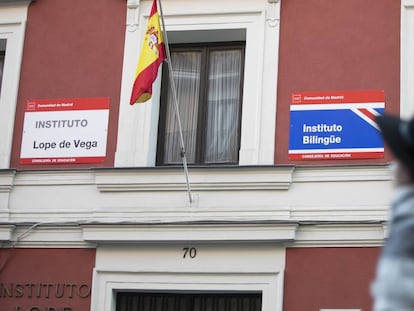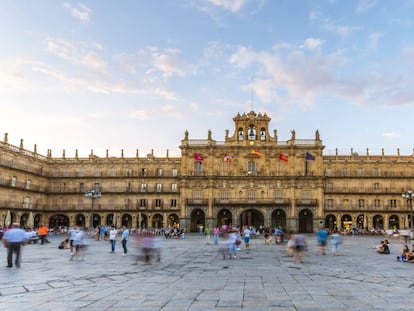Which are the most coveted university degrees in Spain?
Dual programs are on the rise and math is becoming a hot option because of its excellent job prospects


Around 290,000 high school graduates in Spain are taking their university entrance examinations, a grueling set of nationwide tests that began on Monday in some regions and will end mid-month in others. Known officially as Pruebas de Acceso a la Universidad (PAU) and more popularly as Selectividad, these exams account for 40% of the students¡¯ final score, with the other 60% coming from their high school grades. Statistics show that most students will get a passing score, but not all will perform well enough to be admitted into their top career choice.
So which studies are in greatest demand in Spain? In recent years, dual degrees have become increasingly popular, and math is on the rise. The most coveted program for the last five years has been the dual Mathematics/Physics degree, which is offered at nine public universities.

¡°These are degrees with a lot of demand and limited supply. Added to this is social popularity and very good employment options,¡± says Isabel Guti¨¦rrez, the vice-rector of Carlos III University in Madrid.
Two other dual degrees on offer at this institution, International Studies/Business Administration and Law/Political Science, require the highest grades at the entrance exams.
The new programs reflect the fact that for around a decade now, Spanish campuses have been designing degrees that come closer to what the business world is demanding.
Toughest test of all time?
On Tuesday, students in the Valencia region started an online complaint after taking a math test that is part of their university entrance examinations. The perceived difficulty of the test, which was administered on Tuesday, triggered a reaction on the online platform Change.org, where over 30,500 people had signed a petition at 4pm on Wednesday demanding "solutions" to what was described as "the most difficult exam of any year." The government has announced it will create a committee to ensure tests across the country have "the same degree of difficulty." In Spain, powers over education are devolved to the regional governments.
With dual degrees growing in popularity, Madrid¡¯s Autonomous University now offers a combined program in Modern Languages, Culture and Communication; A Coru?a has Biology/Chemistry; Alicante offers Law/Criminology; and Barcelona has a degree in Pharmacy, Human Nutrition and Dietetics.
The next step will be the introduction of more flexible programs, where students will be allowed to select from a wide variety of options, mirroring the US higher education system. But the administrative complexities of the Spanish university system are slowing this process down.
¡°Studying for two degrees at the same time is pretty difficult. These are people with special abilities,¡± says Antonio Bru, the dean of the Mathematics School at the Madrid Complutense University.
One of Bru¡¯s first initiatives was to place these students ¨C who make up a small group ¨C together with those enrolled in regular programs. ¡°These students have to be exposed to other things, they can¡¯t be isolated in the cafeteria, always in their little group. And they can¡¯t get different treatment, or they¡¯ll think of themselves as being something they are not, and so will the educators.¡±
To university with no headscarf or husband

More than one resident of San Crist¨®bal de los ?ngeles, one of the poorest neighborhoods of Madrid, predicted a bad life for Sheima. A daughter of Moroccan immigrants who was herself born in Madrid, she refused to wear a headscarf and went around with boys.
But?these days the 19-year-old is taking her university entrance examinations after graduating from high school with an average grade of over 7 on 10. Sheima wants to study Translation and Interpretation and to eventually join the National Police force.
¡°I¡¯ve wanted to ever since I was little. I think I have the right personality: a strong character, well organized, determined... And I speak three languages [Spanish, Arabic and English], which could contribute a lot to the police,¡± she says.
This is not the life that Sheima¡¯s father had planned for her. When she turned 12, he meant for her to stop going to school, learn how to run a home, and get married early. But her parents got separated, and Sheima went on to high school. ¡°Knowing me, I would have run away from home to study or get a job,¡± she says.
While Sheima does not want to wear a headscarf like her mother, she does not reject her origins. ¡°I love to go to the mosque, praying is a form of meditation. Ramadan purifies you.¡± She now hopes to be a role model for her eight-year-old sister Dina.
English version by Susana Urra.
Tu suscripci¨®n se est¨¢ usando en otro dispositivo
?Quieres a?adir otro usuario a tu suscripci¨®n?
Si contin¨²as leyendo en este dispositivo, no se podr¨¢ leer en el otro.
FlechaTu suscripci¨®n se est¨¢ usando en otro dispositivo y solo puedes acceder a EL PA?S desde un dispositivo a la vez.
Si quieres compartir tu cuenta, cambia tu suscripci¨®n a la modalidad Premium, as¨ª podr¨¢s a?adir otro usuario. Cada uno acceder¨¢ con su propia cuenta de email, lo que os permitir¨¢ personalizar vuestra experiencia en EL PA?S.
En el caso de no saber qui¨¦n est¨¢ usando tu cuenta, te recomendamos cambiar tu contrase?a aqu¨ª.
Si decides continuar compartiendo tu cuenta, este mensaje se mostrar¨¢ en tu dispositivo y en el de la otra persona que est¨¢ usando tu cuenta de forma indefinida, afectando a tu experiencia de lectura. Puedes consultar aqu¨ª los t¨¦rminos y condiciones de la suscripci¨®n digital.










































